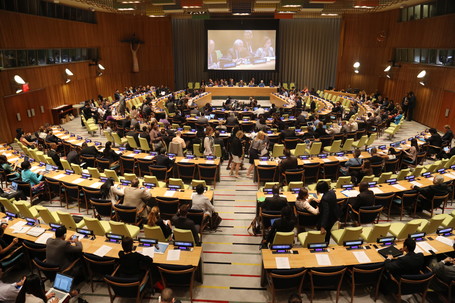
As the member states of the UN prepare to meet in New York to adopt the new Post-2015 Development Agenda, UCLG celebrates the inclusive process that was carried out to negotiate the new sustainable development goals. The Post-2015 process has represented an unprecedented opportunity for local and regional governments to contribute experiences and proposals based on our daily work to the international debate on sustainable development.
Find out more about our Post-2015 Advocacy work in the publication ‘Our Post-2015 Journey: Local and Regional Voices on the Global Stage’
Local and regional governments commit to do our part to communicate the importance of the SDGs to our administrations, partners and communities, and to build on the lessons learned from the MDGs to play our part in their achievement. It is only by working with local communities to overcome local challenges and harness local opportunities that the new global agenda will become a reality by 2030.
Looking forward to Habitat III
One of the clearest achievements of the Post-2015 advocacy work of UCLG and our partners in the Global Taskforce is the inclusion of SDG 11 to “make cities and human settlements inclusive, safe, resilient and sustainable”. Goal 11 is the only goal with an explicit sub-national geographical dimension. As such, SDG11 represents an unprecedented opportunity to mobilize mayors and city leaders behind the Post-2015 Agenda by directly addressing their daily concerns and responsibilities, from urban planning to waste management.
But it must be recognized that all of the Post-2015 goals and targets touch on local responsibilities and that their achievement are dependent on well-functioning local governments. UCLG will continue to call for mechanisms to ensure the localization of the agenda. Localizing the agenda implies making sure that local and regional governments have both the appropriate human and financial resources to carry out our responsibilities for achieving the SDGs. Financing development at sub-national level is a challenge that still needs to be addressed by national governments and the international community. Localization also requires the development of improved local data so that progress can be monitored at sub-national level, and solutions tailored and resources targeted to communities most in need. Localizing the agenda is essential to ensure that no-one is left behind.
We are pleased that the final declaration makes specific reference to the “upcoming United Nations Conference on Housing and Sustainable Urban Development”, to be held in Quito in 2016. We hope that the international community will use Habitat III, the first implementation conference to be held after the Post-2015 Development Summit, to build on the momentum of SDG 11 and to work with local and regional governments to harness the transformative power of urbanization for development. Local and Regional Governments will present our own Global Agenda at the Second World Assembly of Local Authorities, timed to coincide with Habitat III in Quito. This Global Agenda will build on the recommendations made at the UCLG World Congress in Bogotá, the biggest international triennial gathering of local and regional governments.
Local and regional government activity at the Summit
UCLG will facilitate the participation of the Global Taskforce delegation in the Post-2015 Summit and advocate for the localization of the Agenda going forward. UCLG President and Mayor of Istanbul, Kadir Topbaş, will voice the views of the delegation at the interactive dialogue on “Building effective, accountable and inclusive institutions” at United Nations headquarters. UCLG and our Global Taskforce partners will also organize a number of side-events to highlight the role of local and regional governments in the implementation of the Agenda.
Despite the disappointingly limited access to the Summit for non-state actors, local and regional governments will do our upmost to make our voices heard in New York.
For more information on the activity of local and regional governments in New York, see our programme. Please note that, for logistical reasons, access to these events is by invitation only.










